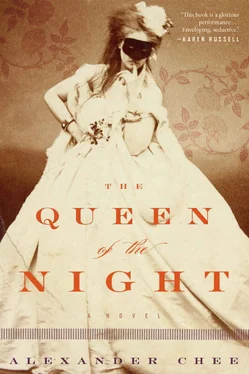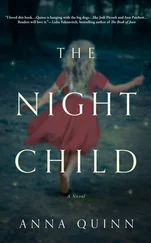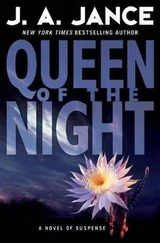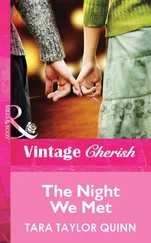As she said this, she sat back in her chair and smiled, her gaze again on me directly. He is our mutual friend, yes? He will be here shortly to confirm you are who we believe you are.
Your education at my hands ends here. You will now renew your relationship with your tenor friend. He is going to train that voice of yours properly this time, in Baden-Baden, at the hand of Pauline Viardot-García. There he will tell everyone you are his protégée.
She returned her attention to me. You will, to show your thanks to me for this, stay with him. She raised her glass. The single condition of this is that you can never leave him and you may never speak to him of this bargain. Not without my permission. Your stay with him repays me for my assistance to you. Leave or betray him, and without question, the dossier I have on you will be sent to the authorities. And the Emperor will then have you to do with as he pleases.
She waited, her good humor unwavering throughout. I am returning you to your owner, she said. But I won’t, she said, likely make you stay with him forever.
You owe me another debt, however, for the humiliation of leaving your position, the Comtesse said. And here is the way you will repay me: The day may come when I will send someone to take you to the Emperor. You will go to him and do whatever he wishes. And whatever else you wear that day, you must wear those earrings.
Slowly, I reached for my glass and raised it. She thought it was to toast her, and she raised her own.
Congratulations, my dear, she said. Your first admirer is one of Europe’s most famous singers. You have done well.
Our glasses touched. At that moment the tenor entered, and the gathered crowd stood and applauded him as he walked over and stood by our table. He bowed deeply to the corners of the room and then begged them to sit. They kept applauding. The maître d’ came and pulled the chair back himself, at which the others took their seats.
He took first the Comtesse’s hand and kissed it, and then mine.
So good to see you again, he said to me. Our little runaway, he said then to the Comtesse.
Yes, my girl. What is your name? the Comtesse asked.
The tenor reached for my hand across the table, the gesture of a lover. I looked at it briefly, cautiously.
I set my hand on the table also and slid it toward his. He then opened his palm, the ruby flower there.
His hand glowed white in the candlelight, the rubies dark in his palm, like blood.
How we hold on to what we believe is ours. How we mourn when it is lost. And how unprepared we are when it then returns to claim us.
Lilliet, I said. Lilliet Berne.
My future lifted up on the light emanating from that ruby rose in his hand, out past the tables of elegant diners and the gleaming walls of the restaurant into the rest of my life. I knew what I was to do. I saw myself take it back from his hand, pin it to my dress, look up at him, smile, thank him, smile at the Comtesse, thank her for being our intermediary, curtsy to her, and leave with him. His carriage taking me on to this education and whatever it would bring me. All of this would begin once I picked it up.
I picked it up.
The tenor was speaking of how glad he was that I’d finally seen him sing in his favorite opera and of how much he hoped one day I would join him onstage as his Leonora. He said this as I moved the flower along my dress, searching for a place to pin it. I wanted just a breath before the rest that was to happen; I could survive it if I could have just another breath.
Without stopping his conversation, he reached over and took my hand, taking the rose back before carefully pinning it over my heart.
When at last I looked up, his face was unexpectedly tender, even kind. His expression told me how strongly he believed he was in a story in which I was the contrite penitent he’d already forgiven for running away.
Thank you for returning to me, he said. He reached up and touched my chin, searching my eyes with his eyes.
The Comtesse smiled approvingly and touched the enormous coil of pearls at her neck.
The tenor’s eyes changed suddenly, concerned, as he looked past me and reached to my ears. He traced one of the emerald earrings. These are an emperor’s ransom, he said, turning to my teacher.
Yes, the Comtesse said. Yes, they are.
After all my time among the Empress’s secrets that no one but the Comtesse would think to keep, I had become one.
MY THEME HERE is love. Love and the gifts of love, love kept secret, love lost, love become hatred, war, a curse. Love become music. Love and those who died for love.
Love — and, especially, first love. My first love, the one I could not keep and could never, will never, lose.
If you were to have visited me in my apartment on the avenue de l’Opéra, you would have been greeted in the foyer by an onyx falcon on a wrought-iron pedestal beneath an enormous chandelier, displayed as if it were the most valuable thing I owned. And it was very fine — the claws were gold; the eyes, carved rubies; the feathers outlined carefully, so that they glittered even in the dark. A small gold dish for visiting cards sat by its feet, and beneath that, hidden in the pedestal, was a jewel safe.
This was a trap of a kind, bait for thieves.
Inside were some jewels I did not value, my real treasures in another safe hidden elsewhere.
I kept the emerald earrings from the Comtesse there. My hope was that if a thief found them they would convince him he had discovered my trove and he would leave immediately and take nothing else.
So far no thief had been thus blessed.
Jewels told you a story each time you put them on, as Faust’s Jewel Song made plain. Sometimes the story was of your future, sometimes of your past. You sold them when you never wanted to hear the story again. I had never found cause to sell even one emerald, but neither did I wear them more than a few times in the years that followed the night she gave them to me. I was sometimes asked as to their provenance, and each time I could only shrug.
A gift, I would say.
With time, they had proven to be a spur to the richest of my admirers who sought to do them one better, jealously imagining my spending other evenings with the one who could afford such gifts, and I could never say otherwise. They’d had their uses, I suppose. But that night with the Emperor had never come to pass, and now that he is dead, it never will.
I never doubted my sense of their provenance. I’d had an education in jewels since, and the handiwork, even the color of the stones, told me the story the Comtesse would never tell. I am sure that the Emperor had them made at the same time, perhaps even from the same stone, as the color and style were a perfect match. Had the Comtesse ever worn them in front of the Empress? Or had the Comtesse, in turn, ever seen the Empress’s brooch? Each would have known at once, as I had.
Divided stone, divided heart.
The Comtesse had come to Paris well after the marriage to the Empress had been made, which meant the Emperor had kept these, perhaps meaning to give them to the Empress later on the occasion of an anniversary of some kind or the birth of a son, but he instead gave them to the woman who would go to her death believing she should have been empress.
That the Comtesse had kept these earrings all this time told me she had been nursing some secret hope for herself and the Emperor. On the night she gave them to me, these were that hope’s grave. And by instructing me to wear them if I went to him, she sought to create a certain moment. When I would undress for the Emperor and he pulled back my hair, these were what he would see.
Читать дальше












